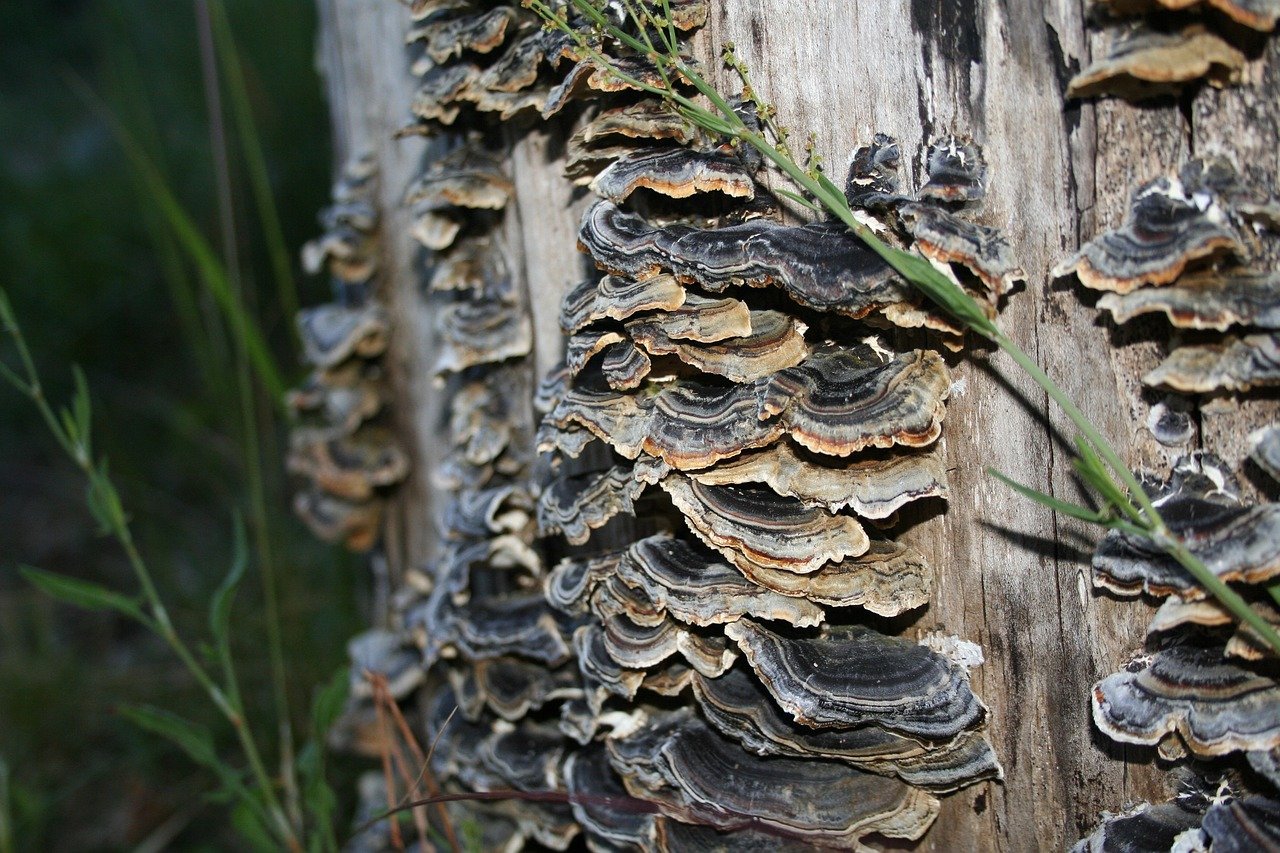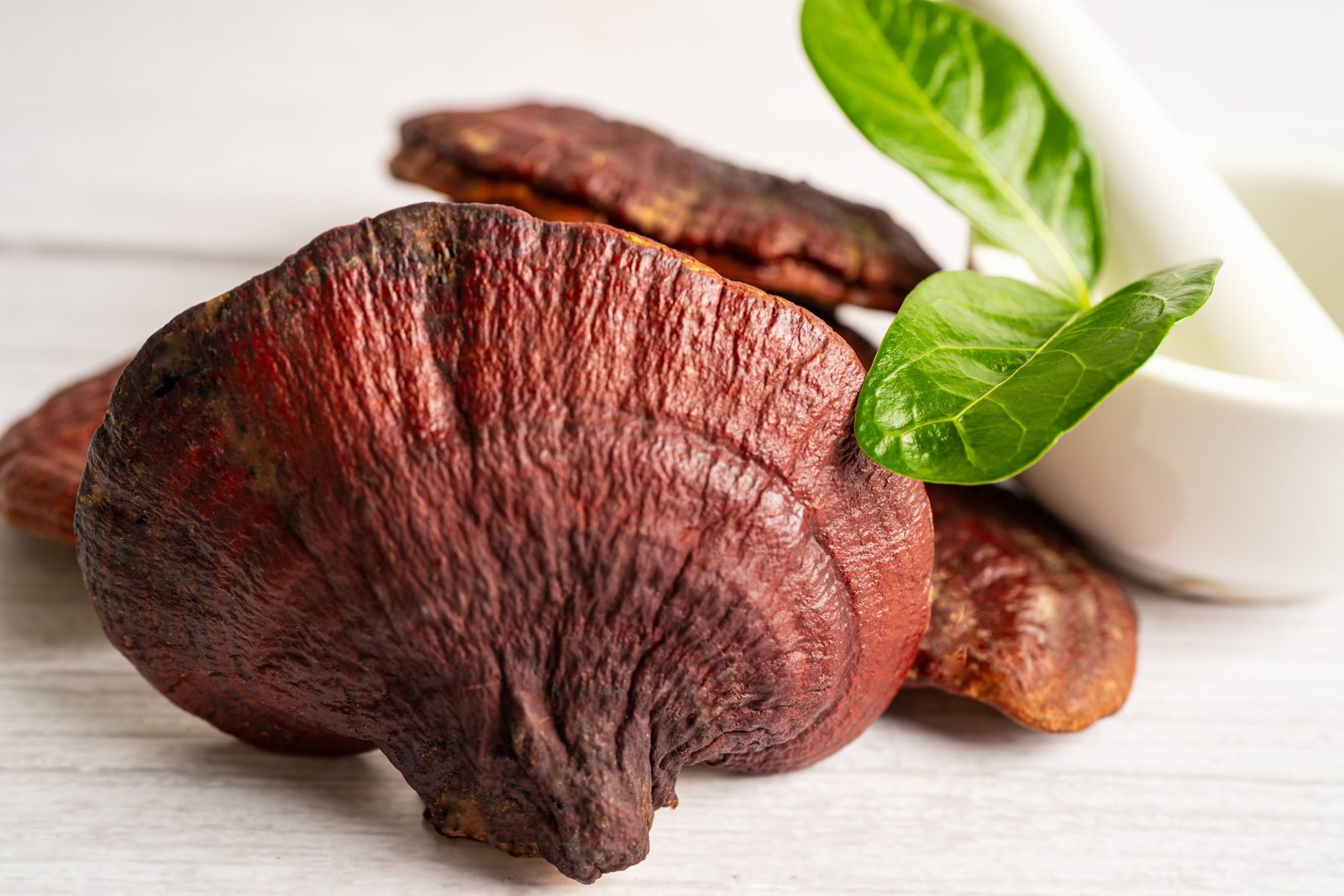Turkey Tail mushrooms, aptly named for their striking resemblance to the spectrum of colours found in turkey feathers, are as mesmerising in their potential health benefits as they are in their unique aesthetics. Their vibrant, banded colours sweep from warm honey-browns and tawny reds to cool blue-greys and whites, echoing the familiar spread of a turkey’s tail. The fringed caps with soft fuzzy surfaces sit in clusters on dead logs, providing a visual treat to those who encounter them in the wild.
While the Turkey Tail mushroom’s stunning appearance is undoubtedly captivating, it is its powerful health-enhancing qualities that truly set it apart. A closer look at this extraordinary fungus reveals a host of potent compounds and properties, establishing it as a prominent player in the world of natural healing. The potential benefits span from antioxidant enrichment to robust immune support, and even potential cancer-fighting attributes.
A Well of Antioxidants
The power of Turkey Tail mushrooms as a health-promoting powerhouse is inherently tied to their extraordinary wealth of antioxidants. In the constant battle against free radicals – rogue molecules that cause cellular damage, contribute to the ageing process and propagate numerous diseases – antioxidants serve as our body’s crucial defence line. The body generates free radicals as a byproduct of metabolism, but exposure to environmental toxins, certain foods, and stress can significantly increase their numbers, potentially leading to an imbalance known as oxidative stress.
Fortunately, Turkey Tail mushrooms stand as guardians of health, acting as a storehouse for valuable antioxidant compounds. Their dense composition of flavonoids and phenolic antioxidants offers a robust shield against the pervasive threat of free radicals.
Flavonoids, a diverse group of plant chemicals responsible for the vivid pigmentation in a variety of fruits, vegetables, and fungi, are one of the key components of Turkey Tail mushrooms. Not only do they contribute to the mushroom’s aesthetic appeal, but they also endow it with substantial antioxidant and anti-inflammatory properties.
These versatile compounds scavenge free radicals, potentially helping neutralise their harmful effects. They also regulate cellular activity and fight inflammation, a key contributor to chronic diseases. Incorporating Turkey Tail mushrooms into your diet can, therefore, provide a substantial flavonoid boost, potentially helping to mitigate the risk of inflammation-induced conditions.
Complementing the mushroom’s flavonoid content is a range of phenolic compounds, another class of powerful antioxidants. These compounds directly contribute to the Turkey Tail mushroom’s antioxidant activities. By neutralising harmful free radicals, they assist in maintaining the balance between the body’s production of free radicals and its ability to counteract their harmful effects.
Phenolic compounds play a significant role in managing inflammation. They can inhibit enzymes responsible for producing pro-inflammatory substances, effectively curtailing the cascade of events that leads to chronic inflammation. In this way, the phenolic components of Turkey Tail mushrooms offer a two-fold defence mechanism: combating oxidative stress and reducing inflammation.
The combination of flavonoids and phenolic compounds within Turkey Tail mushrooms creates an antioxidant synergy with far-reaching potential benefits. This symbiotic relationship provides a comprehensive defence against free radicals, potentially helping safeguard cellular health and functionality. By mitigating oxidative stress, this antioxidant partnership supports the body’s natural defence mechanisms and promotes overall well-being.
With their vibrant hues, Turkey Tail mushrooms do more than paint our natural landscapes; they potentially infuse our bodies with nature’s potent defenders. As we continue to understand the deep-seated connections between nature and human health, it becomes clear that the unassuming Turkey Tail mushroom is a veritable treasure chest of health-enhancing properties.
The Turkey Tail mushroom’s immune-supporting qualities make it a potent ally in supporting health and wellness. A particular type of complex sugar found in Turkey Tail mushrooms, called beta-glucans, plays a significant role in its immune-boosting effects. Beta-glucans are known to stimulate the immune system, enhancing the activity of several types of white blood cells including natural killer cells, macrophages, and T-cells. These cells are responsible for identifying and eliminating harmful substances or infected cells in the body, fortifying the body’s resilience against diseases and infections.
Harnessing Potential Cancer Therapy
Perhaps one of the most intriguing areas of research around Turkey Tail mushrooms is their potential use in cancer therapy. The mushroom contains two unique polysaccharopeptides: Polysaccharide-K (PSK) and Polysaccharide-P (PSP). These compounds have demonstrated promising effects in cancer treatment, particularly when used alongside traditional therapies.
PSK has been used as an adjunct therapy in Japan for several decades, given its potential to stimulate the immune system and inhibit cancer growth. PSP, on the other hand, has been recognised for its potential in combating lung cancer, showing promising results in both laboratory and clinical studies. These studies suggest Turkey Tail may have a significant role to play in future cancer treatment modalities.
Turkey Tail is an emblem of nature’s magnificence, serving not only as a feast for the eyes with its vibrant bands but also as a treasure trove of potential health-enhancing properties. Its rich blend of antioxidants, powerful immune-supporting attributes, and promising role in cancer therapy all point to a humble yet powerful organism that could be a cornerstone in the future of natural healing and medicine.



